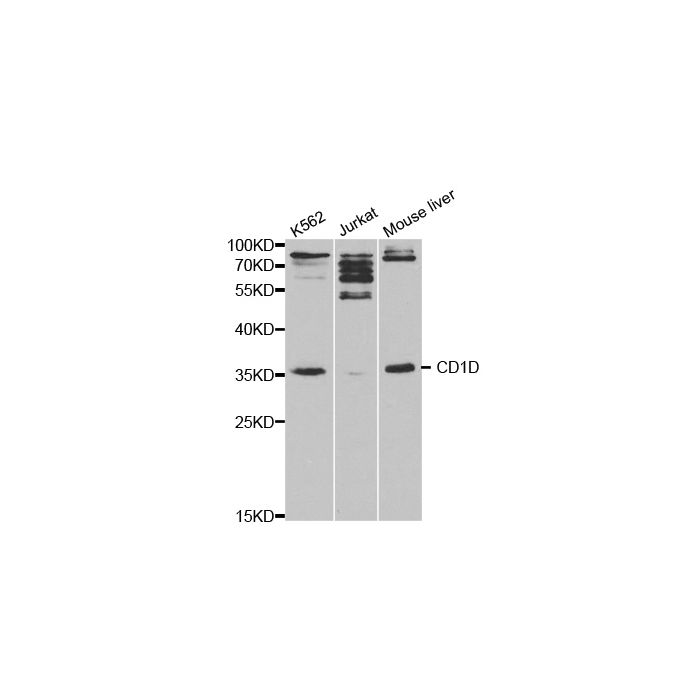CD1D polyclonal, anti-human, mouse
€388.00
In stock
SKU
BS6546
Background:
The CD1 multigene family encodes five forms of the CD1 T cell surface glycoprotein in human, designated CD1A, 1B, 1C, 1D and 1E. CD1, a type 1 membrane protein, has structural similarity to the MHC class I antigen and has been shown to present lipid antigens for recognition by T lymphocytes. CD1 antigens are associated with β-2-Microglobulin and expressed on cortical thymocytes, Langerhans cells, a B cell subset and some dendritic cells. Adaptor protein complexes and CD1-associated chaperones control CD1 trafficking and the development and activation of CD1-restricted T cells. CD1D is present on human intestinal epithelial cells (IEC) and exists as a β-2-Microglobulin-independent nonglycosylated form or a β-2-Microglobulin-dependent glycosylated form.
Alternative Name:
Antigen-presenting glycoprotein CD1d, CD1.1, CD1A, CD1d, CD1D antigen, CD1D antigen d polypeptide, CD1d molecule, CD1D, Cd1d1, differentiation antigen CD1 alpha 3, HMC class I antigen like glycoprotein CD1D, Ly 38, MGC34622, R3, R3G1, T cell surface glycoprotein CD1d, Thymocyte antigen CD1D,
Application Dilution: WB: 1:500 - 1:2000, IF: 1:50 - 1:200
Specificity: CD1D polyclonal antibody detects endogenous levels of CD1D protein.
Immunogen:
Recombinant full length Human CD1D.
MW: ~ 37 kDa
Swis Prot.: P15813
Purification & Purity:
The antibody was affinity-purified from rabbit antiserum by affinity-chromatography using epitope-specific immunogen and the purity is > 95% (by SDS-PAGE).
Format:
1mg/ml in PBS with 0.1% Sodium Azide, 50% Glycerol.
Storage:
Store at 4°C short term. Aliquot and store at -20°C long term. Avoid freeze-thaw cycles.
For research use only, not for use in diagnostic procedure.
The CD1 multigene family encodes five forms of the CD1 T cell surface glycoprotein in human, designated CD1A, 1B, 1C, 1D and 1E. CD1, a type 1 membrane protein, has structural similarity to the MHC class I antigen and has been shown to present lipid antigens for recognition by T lymphocytes. CD1 antigens are associated with β-2-Microglobulin and expressed on cortical thymocytes, Langerhans cells, a B cell subset and some dendritic cells. Adaptor protein complexes and CD1-associated chaperones control CD1 trafficking and the development and activation of CD1-restricted T cells. CD1D is present on human intestinal epithelial cells (IEC) and exists as a β-2-Microglobulin-independent nonglycosylated form or a β-2-Microglobulin-dependent glycosylated form.
Alternative Name:
Antigen-presenting glycoprotein CD1d, CD1.1, CD1A, CD1d, CD1D antigen, CD1D antigen d polypeptide, CD1d molecule, CD1D, Cd1d1, differentiation antigen CD1 alpha 3, HMC class I antigen like glycoprotein CD1D, Ly 38, MGC34622, R3, R3G1, T cell surface glycoprotein CD1d, Thymocyte antigen CD1D,
Application Dilution: WB: 1:500 - 1:2000, IF: 1:50 - 1:200
Specificity: CD1D polyclonal antibody detects endogenous levels of CD1D protein.
Immunogen:
Recombinant full length Human CD1D.
MW: ~ 37 kDa
Swis Prot.: P15813
Purification & Purity:
The antibody was affinity-purified from rabbit antiserum by affinity-chromatography using epitope-specific immunogen and the purity is > 95% (by SDS-PAGE).
Format:
1mg/ml in PBS with 0.1% Sodium Azide, 50% Glycerol.
Storage:
Store at 4°C short term. Aliquot and store at -20°C long term. Avoid freeze-thaw cycles.
For research use only, not for use in diagnostic procedure.
| Is Featured? | No |
|---|
Write Your Own Review

